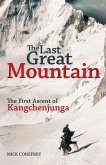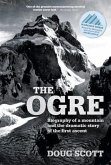The "unapproachable classic in Alpine literature" (Times) on the dramatic first ascent of the Matterhorn, issued for the first time with the 56 photographs the author made in 1874 and would have included had it been possible.
Hinweis: Dieser Artikel kann nur an eine deutsche Lieferadresse ausgeliefert werden.
Hinweis: Dieser Artikel kann nur an eine deutsche Lieferadresse ausgeliefert werden.








